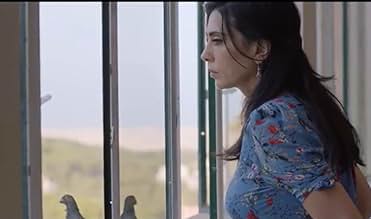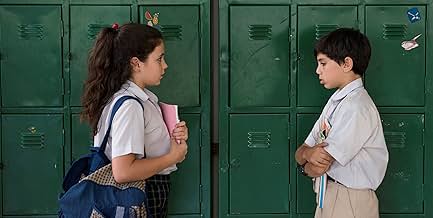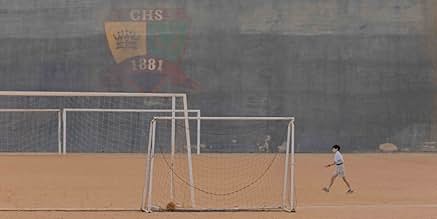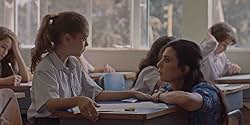AVALIAÇÃO DA IMDb
6,7/10
1,2 mil
SUA AVALIAÇÃO
Durante a invasão do Líbano em 1982 em uma escola nos arredores de Beirute, Wissam, de 11 anos, tenta contar a uma colega sobre sua paixão por ela, enquanto seus professores em lados diferen... Ler tudoDurante a invasão do Líbano em 1982 em uma escola nos arredores de Beirute, Wissam, de 11 anos, tenta contar a uma colega sobre sua paixão por ela, enquanto seus professores em lados diferentes da política tentam mascarar seus medos.Durante a invasão do Líbano em 1982 em uma escola nos arredores de Beirute, Wissam, de 11 anos, tenta contar a uma colega sobre sua paixão por ela, enquanto seus professores em lados diferentes da política tentam mascarar seus medos.
- Prêmios
- 16 vitórias e 14 indicações no total
Saeed Sarhan
- Georges
- (as Said Serhan)
Avaliações em destaque
Despite that the movie is well captured in terms of technology like cameras and equipment, and the casting staff did tremendous job, the movie all in all lacked a strong scenario and had one major event, the whole movie covers this event throughout half day. and it was very slow moving! Disappointing.
It is a Lebanese 🇱🇧 movie , the movie starts good but then nothing happens it stays on the same rhythm the whole movie which gets boring, yes there is some nice moments but still
Oualid Mouaness' debut film "1982" is a beautifully blended coming-of-age tale that follows the 1982 invasion of Lebanon as seen through the eyes of a schoolboy who tries relentlessly to announce his love to a classmate on the same evening that disaster strikes. Mouaness, who in addition to directing, wrote and produced this film, which is unlike any other in its ability to draw emotion and suspense with the subtlety and grace of a true auteur. With exquisite performances from Mohamad Dalli (Wissam) and Nadine Labaki (Yasmine), this script becomes a story that is as palpable as it is entertaining, consistently delivering on effective blocking and delivery that progresses the film organically. As effective as the dialogue and action are, however, I would be remiss not to mention what is possibly the film's greatest strength, its silences. Mouaness strategically injects the action with silences that elevate this film to a new level of excellence, drawing out each interaction and allowing the impact of this event to fully wash over the audience. "1982" is one of the finest contemporary examples of narrative cinema, and one that will continue to push the envelope of what it means to be a filmmaker.
I have been watching many foreign and indy movies on Kanopy, and this was a wonderful surprise. The story set against the backdrop of the events in Lebanon in 1982 felt highly realistic. I cared about the characters, especially the young lead. For those of us in the US blessed with never having experienced invasion, the backdrop of war and how it affects people's lives was a jarring reminder. It especially seems so for the middle-class Lebanese depicted here. I knew the tragedies that would soon be upon Beirut, and it was affecting. Afterwards, I looked up the history; it was extraordinarily convoluted. Perhaps it was as baffling to these Lebanese, who must have wondered what in the world was happening to their country.
On June 6, 1982, exactly 38 years after D-Day, roughly 60,000 Israeli troops and more than 800 tanks, heavily supported by aircraft, attack helicopters, artillery, and missile boats invaded Southern Lebanon, a country already involved in a decades-long civil war. Israel's publicly-stated objective was to push PLO (Palestine Liberation Organization) forces back 40 kilometers (25 miles) to the north and establish an expanded security zone that would put northern Israel out of range of the continuing onslaught of PLO rockets.
In his first feature film, 1982, winner of the Network for the Promotion of Asian Cinema (NETPAC) award at the Toronto Film Festival, Lebanese director Oualid Mouaness looks at the Israeli-Lebanese War through the eyes of pre-adolescent children in Cedar High School, a private elementary school near Beirut. Based on his own experience as a ten-year old student on the last day of school in Lebanon in 1982, Mouaness' film explores the children's attempt to make sense of an incomprehensible situation, one that they can sense is fraught with danger for themselves and their families.
The camera, under the direction of cinematographer Brian Rigby Hubbard ("Ambition"), opens the film with shots of the beautiful and peaceful surrounding countryside but the landscape is soon punctured by the sound of telephone lines being blown up, tanks driving on the nearby streets, warships dotting the sea, and dueling fighter jets, like an out-of-sync video game, closing any space between the silences. On the last school day of the year, 11-year-old Wissam's (Mohamad Dalli) focus is not on what is going on outside the school, however, but on summoning enough courage to tell a girl in his class, Joana (Gia Madi), that he loves her.
Part of his reluctance is that his parents have told him that he should wait until he is older before expressing his love to someone. Watching Joana after final exams, however, he follows her trying to get up enough courage to tell her what he rehearses in front of the bathroom mirror "Joana, I love you. Joana, I love you." Though his best friend Majid (Ghassan Maalouf) tells him that we are not in America and this is not a movie, he insists on leaving her a note in her locker with a picture he drew of a superhero named Tigron who resembles a Japanese Super Robot from the anime television series "UFO Robot Grendizer."
As the children look out the window to find the source of the increasing noise, Mouaness juxtaposes an adult relationship that is more complex but also filled with fear and avoidance. As plans are underway for the student's graduation, Yasmine (Nadine Labaki, "Capernaum"), homeroom teacher and exam administrator, is in a relationship with fellow teacher Joseph (Rodrigue Sleiman, "Good Morning"). Straining to avoid discussing their political differences over the war in order to create a safe environment for the children, Yasmine struggles to have her students focus on their exams, telling them "it is nothing. It is far away," and that what happens outside does not concern them.
As the children wait for their parents to pick them up and the tension increases, Wissam resorts to fantasies about how the robot Tigron can save them from harm. "What's going on?" Joana asks, looking away. "I don't know," Wissam replies. While his full understanding of events taking place is spotty, he reaches out to protect Joana in a way that signals the beginning of his maturity. Making sure that she gets on the bus seated next to him, he seems to recognize perhaps for the first time that the truth of one's relationship to another human being is not only the physical attraction but the commitment to love and protect.
In this lovely film which was eight years in the making, Mouannes explores, "the idea that children have a world that's complete for them. They sort of understand what's going on in the adult world but they have peace with how complete their own world is in and of itself." He shows, in the phrase of Israeli author Aharon Applefeld ("To the Edge of Sorrow") that in "the darkest places of human behavior generosity and love can survive; that humanity and love can overcome cruelty and brutality." "I see the world," he says, "in a very positive light and try to hold the darkness." That is his gift to us in 1982.
In his first feature film, 1982, winner of the Network for the Promotion of Asian Cinema (NETPAC) award at the Toronto Film Festival, Lebanese director Oualid Mouaness looks at the Israeli-Lebanese War through the eyes of pre-adolescent children in Cedar High School, a private elementary school near Beirut. Based on his own experience as a ten-year old student on the last day of school in Lebanon in 1982, Mouaness' film explores the children's attempt to make sense of an incomprehensible situation, one that they can sense is fraught with danger for themselves and their families.
The camera, under the direction of cinematographer Brian Rigby Hubbard ("Ambition"), opens the film with shots of the beautiful and peaceful surrounding countryside but the landscape is soon punctured by the sound of telephone lines being blown up, tanks driving on the nearby streets, warships dotting the sea, and dueling fighter jets, like an out-of-sync video game, closing any space between the silences. On the last school day of the year, 11-year-old Wissam's (Mohamad Dalli) focus is not on what is going on outside the school, however, but on summoning enough courage to tell a girl in his class, Joana (Gia Madi), that he loves her.
Part of his reluctance is that his parents have told him that he should wait until he is older before expressing his love to someone. Watching Joana after final exams, however, he follows her trying to get up enough courage to tell her what he rehearses in front of the bathroom mirror "Joana, I love you. Joana, I love you." Though his best friend Majid (Ghassan Maalouf) tells him that we are not in America and this is not a movie, he insists on leaving her a note in her locker with a picture he drew of a superhero named Tigron who resembles a Japanese Super Robot from the anime television series "UFO Robot Grendizer."
As the children look out the window to find the source of the increasing noise, Mouaness juxtaposes an adult relationship that is more complex but also filled with fear and avoidance. As plans are underway for the student's graduation, Yasmine (Nadine Labaki, "Capernaum"), homeroom teacher and exam administrator, is in a relationship with fellow teacher Joseph (Rodrigue Sleiman, "Good Morning"). Straining to avoid discussing their political differences over the war in order to create a safe environment for the children, Yasmine struggles to have her students focus on their exams, telling them "it is nothing. It is far away," and that what happens outside does not concern them.
As the children wait for their parents to pick them up and the tension increases, Wissam resorts to fantasies about how the robot Tigron can save them from harm. "What's going on?" Joana asks, looking away. "I don't know," Wissam replies. While his full understanding of events taking place is spotty, he reaches out to protect Joana in a way that signals the beginning of his maturity. Making sure that she gets on the bus seated next to him, he seems to recognize perhaps for the first time that the truth of one's relationship to another human being is not only the physical attraction but the commitment to love and protect.
In this lovely film which was eight years in the making, Mouannes explores, "the idea that children have a world that's complete for them. They sort of understand what's going on in the adult world but they have peace with how complete their own world is in and of itself." He shows, in the phrase of Israeli author Aharon Applefeld ("To the Edge of Sorrow") that in "the darkest places of human behavior generosity and love can survive; that humanity and love can overcome cruelty and brutality." "I see the world," he says, "in a very positive light and try to hold the darkness." That is his gift to us in 1982.
Você sabia?
- CuriosidadesDirector Oualid Mouaness was actually a student in the school where "1982" was filmed.
Principais escolhas
Faça login para avaliar e ver a lista de recomendações personalizadas
- How long is 1982?Fornecido pela Alexa
Detalhes
- Data de lançamento
- Países de origem
- Centrais de atendimento oficiais
- Idiomas
- Também conhecido como
- Nineteen Eighty Two
- Locações de filme
- Brummana, Líbano(main location: Brummana High School)
- Empresas de produção
- Consulte mais créditos da empresa na IMDbPro
Bilheteria
- Faturamento bruto nos EUA e Canadá
- US$ 43.829
- Fim de semana de estreia nos EUA e Canadá
- US$ 4.900
- 12 de jun. de 2022
- Faturamento bruto mundial
- US$ 60.751
- Tempo de duração1 hora 40 minutos
- Cor
Contribua para esta página
Sugerir uma alteração ou adicionar conteúdo ausente




















